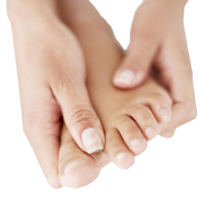
Orthotic Prescriptions
Orthotic Prescriptions

Orthotic therapy is commonly used to treat a large number of foot and lower limb conditions.
As the type and nature of complaints vary, so too does the type of orthotic.
There are many factors that need to be considered in prescribing an orthotic, such as:
• The age of the patient
• The intended effect
• The type of sport or activity
• The shoe
• The influence of an orthotic on the lower limb mechanics.
This is where the experience of a Podiatrist who is well versed in orthotic prescription is crucial in ensuring that an appropriate orthotic is made.
Orthoses can help with the following conditions:
CHILDREN:
Adults:
Diabetic and High risk foot:
• Flat feet
• Heel pain
• Ankle soreness
• Awkward walking/running
• Knock knees
• Inturned hips and knees
• Knee, leg hip or lower back pain
• Foot or ankle pain
• Sore heels and arches
• Knee, hip or groin pain
• Shin pain or leg soreness
• Lower back ache
• Awkward walking or running technique
• Muscle fatigue in the legs or thighs
• Healing or prevention of pressure sores and ulcers
• Tender feet
• Tender/arthritic feet
attention:
IMPORTANT:
Careful attention needs to be given to patients who are diabetic, arthritic or have poor blood circulation.
These conditions can result in decreased blood supply to the feet and legs, which greatly increases the risk of:
• Infection
• Nerve damage
• Ability to heal
These factors can cause further complications if they are left untreated.
At Eltham Podiatry, we take a preventative
and cautious approach with such conditions.
We carefully monitor our patients to ensure that there are no complications. Any conditions that might arise are addressed promptly and with diligent care.
People with diabetes are at increased risk of peripheral arterial disease and neuropathy, as well as having a higher risk of developing infections and decreased ability to clear infections. Therefore, people with diabetes are prone to frequent and often severe foot problems and a relatively high risk of infection, gangrene and amputation.
Copyright ©2014 by Eltham Podiatry • All Rights reserved
Copyright ©2016 Eltham Podiatry • All Rights reserved
